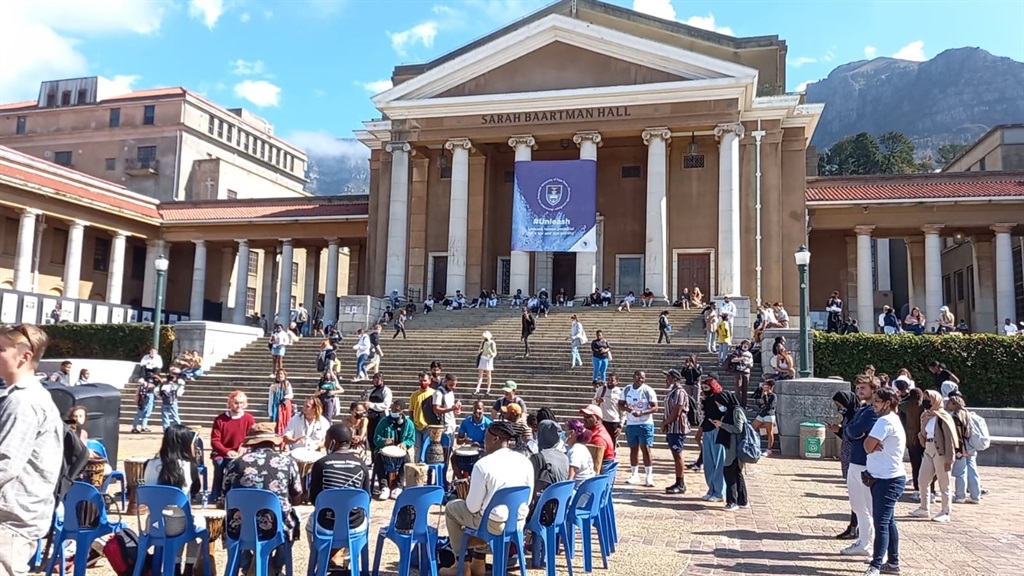
Professor David Benatar, author of The Fall of the University of Cape Town, writes that the problem at the university runs much deeper than the vice-chancellor, who is at least as much a symptom of UCT's fall as its cause.
It is not beneath me to say, "I told you so". The toxic leadership at the University of Cape Town (UCT) and the attempts to cover this up, which have been the subject of recent and ample news coverage, will come as no surprise to readers of my book The Fall of the University of Cape Town, published in 2021 by Politicsweb Publishing.
What might come as a welcome surprise is that there has now, finally, been some pushback from within the institution – including from the Academics' Union, from sectors of Senate, and from about half of UCT's governing body – Council. However, with rare individuals as exceptions, these groupings are all complicit in the problems that brought us to this point.
Council and Senate were well aware of the problems with Professor Mamokgethi Phakeng's candidacy for the vice-chancellorship of UCT. They nonetheless endorsed her appointment in 2018.
For example, while trenchant concerns were raised by rare, brave individuals in Senate, these were quickly neutralised by the inevitable and inevitably trumping "transformation card", which was sufficient for the vast majority of Senate to swallow the laughable reassurances that the problems were surmountable.
As a result, of those Senators present at the relevant meeting, 122 voted in favour of her candidacy, only 29 against, and 11 abstained.
Ombud's report suppressed
The predictable problems were even more apparent four years later, in March 2022, when Professor Phakeng was put forward for a second term of office. These problems had already manifested very publicly, not least as a result of a report by then-Ombud Zetu Makamandela-Mguqulwa, a report which the Council attempted to suppress.
One would have hoped that the Senate of Africa's leading university would, by this stage, have learned its lesson. If anything, it became both more gullible and culpable. In the face of overwhelming evidence of dysfunction, Professor Phakeng's second term of office was supported by 142 senators, opposed by 31, with nine abstaining.
READ | Under fire UCT vice-chancellor Phakeng rallies support amid threat of court battle
It is a mark of how bad things have now become, just months later, that at least part of Senate has found its voice and that about half of Council has broken ranks to prevent a further cover-up.
However, the problem runs much deeper than the vice-chancellor, who is at least as much a symptom of UCT's fall as its cause. Even if the newly vertebrate are successful in gaining some accountability from the vice-chancellor and the Chair of Council, there is every reason to think that the underlying problems will remain. Very few of these will reach public attention, much less generate public outrage, but they are no less real and no less damaging.
Accusations
These problems are too many to enumerate here, but one is noteworthy, not least because it is again manifesting among inveterate supporters of Professor Phakeng. In free societies, criticism can be expressed, and poor decisions reversed. In unfree societies, criticism is suppressed, and ideology stands in the way of recognising, let alone undoing bad decisions.
While UCT – and South Africa – remain notionally free societies, there is a deep institutional and national pathology, whereby certain classes of people, defined especially by "race" and "sex", are protected to a significant (but not total) degree from criticism.
The strategy is to label any criticism of individual members of these classes as a manifestation of racism and sexism. The critics, it is alleged, are people who are unable to accept, in this case, a "successful black woman" as a leader.
UCT's Black Academic Caucus is among the bodies that can be counted upon to offer such paranoid accusations. Until recently, the Academics' Union has been among the bodies to have been silenced or co-opted by an atmosphere in which such accusations are pervasive.
READ | UCT's Academics Union threatens legal action over 'unlawful' council decisions
Even Rebecca Davis, who broke the story about the latest ruckus at UCT, has not entirely shed herself of this narrative. In her article, she parroted the "findings" of a UCT report which said that "there was insufficient support for black academics in leadership positions at UCT".
Had Ms Davis read my book, she would have been aware of the crucial methodological flaw in that report – it did not investigate whether such claims had any substance. Instead, it merely reported them. Reporting a claim is not the same as investigating it and finding that it has merit.
The accusation that criticisms of Professor Phakeng are rooted in racism and sexism are, of course, textbook bullshit (in the Frankfurtian sense of that term). However, it remains the case that even other "black women", such as Ombud Makamandela-Mguqulwa, who exercise their critical capacities, are not exempt from having such accusations levelled at them. Other demographics are even more vulnerable to such damaging accusations. The result is a social silencing of criticism and a significant impediment to accountability.
This makes UCT and South Africa less able to correct course. Believe me when I say that it will not end here. The fall of UCT will continue, whether or not the failings will be in the public eye, as some of them are now.
- David Benatar, a philosophy professor, is the author of The Fall of the University of Cape Town: Africa's leading university in decline. That book and this article were written in his personal capacity.
*Want to respond to the columnist? Send your letter or article to opinions@news24.com with your name and town or province. You are welcome to also send a profile picture. We encourage a diversity of voices and views in our readers' submissions and reserve the right not to publish any and all submissions received.
Disclaimer: News24 encourages freedom of speech and the expression of diverse views. The views of columnists published on News24 are therefore their own and do not necessarily represent the views of News24.




 Publications
Publications
 Partners
Partners























